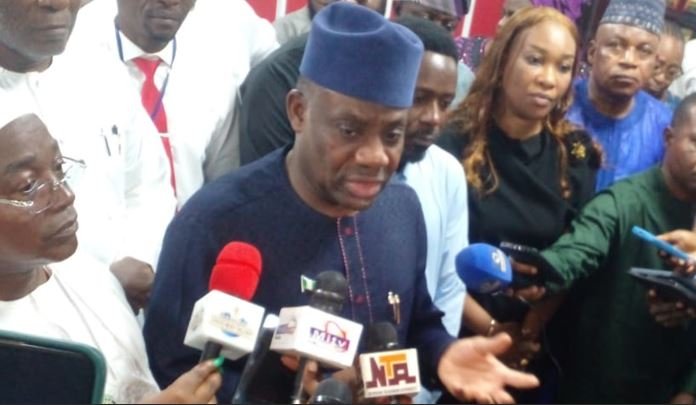The Federal Government has blamed weak institutional leadership and poor management systems for the shocking revelation that about ₦675 billion allocated to Nigeria’s tertiary institutions between 1999 and 2024 remains unspent.
Minister of State for Education, Dr. Tunji Alausa, disclosed this during the annual conference of the Chartered Institute of Directors (CIOD) in Abuja, explaining that the problem is not inadequate funding but a chronic lack of effective leadership and accountability within the nation’s higher education sector.
“Our academics are brilliant, but our institutional systems are failing,” he said. “We have over ₦675 billion lying idle in various accounts across our universities, polytechnics, and colleges of education. This is not because the money was not released but because it was never properly utilised.”
According to Alausa, the idle funds were meant for infrastructure, laboratories, academic programmes, and capacity development—but instead of driving progress, they’ve become a symbol of inefficiency and bureaucratic stagnation.

Table of Contents
The Numbers Behind the Waste
Data shared by the Ministry of Education and the Tertiary Education Trust Fund (TETFund) shows that over the last two and a half decades, allocations meant for capital development in higher institutions have consistently been delayed or returned due to poor project execution.
The minister explained that from 1999 to 2024, billions of naira meant for classrooms, ICT centres, hostels, and research facilities simply sat untouched. Even worse, many institutions left these funds dormant in accounts rather than investing them to generate returns for their projects.
In response, the Federal Government has given all public tertiary institutions 30 days to account for unutilised funds and show evidence of progress on TETFund-backed projects. Institutions that fail to comply risk losing future allocations, which will instead be redirected to more accountable schools or urgent national education needs.
To enhance transparency, TETFund announced plans to launch a public online dashboard where Nigerians can monitor disbursements and project utilisation in real time.
“We’re moving to a performance-driven model. Every allocation must be matched with measurable results,” the minister said.
TETFund recently received ₦1.6 trillion from the Federal Government for 2025 interventions. Out of this, ₦460 billion—around 40%—is dedicated to projects across tertiary institutions. The breakdown includes ₦225 billion for student loans through the Nigeria Education Loan Fund (NELFUND), ₦70 billion for energy support in schools, ₦25 billion for campus security, and ₦100 billion for improving medical science training.

Leadership and Systemic Failures
Dr. Alausa emphasised that the recurring problem is not just about funds sitting idle—it reflects deep-rooted structural and leadership weaknesses in Nigeria’s tertiary education system.
According to him, many vice-chancellors, rectors, and provosts lack adequate training in governance, project management, and modern institutional systems. While they excel academically, they often fall short in administrative efficiency, procurement processes, and long-term planning.
This misalignment has led to stalled projects, incomplete buildings, poorly equipped laboratories, and in some cases, outright fund mismanagement.
“We can’t keep throwing money at problems that are rooted in poor leadership,” Alausa said. “It’s time to fix the people and systems responsible for implementation.”
He called on professional bodies like the Chartered Institute of Directors to partner with the Ministry of Education in training tertiary institution leaders on accountability, governance, and performance monitoring.
The minister also admitted that exposing these lapses publicly is uncomfortable but necessary for reform.
“I don’t mind washing our dirty linen in public if that’s what it takes to clean up the system,” he said.
The Road to Reform and Accountability
The Ministry of Education and TETFund are now pursuing a four-point reform strategy aimed at restoring credibility and efficiency to Nigeria’s higher education funding system.
- Mandatory Accountability Reports – All institutions must file detailed reports on how they have used—or failed to use—TETFund allocations. Defaulting institutions risk suspension or redirection of future grants.
- Public Transparency Dashboard – A new digital monitoring tool will allow citizens to see how much each school receives and what it spends. This will make it harder for institutions to hide behind bureaucracy.
- Capacity Building for Leaders – The government plans to establish leadership training for vice-chancellors, rectors, and provosts, equipping them with skills to manage funds responsibly and align institutional goals with national priorities.
- Performance-Linked Funding – Future allocations will depend on how effectively past funds were used. Projects that fail to meet timelines or quality standards will no longer be funded.
Education analysts have hailed the move as a long-overdue step. Dr. Adewale Fajimi, an education policy consultant, said the biggest problem in Nigeria’s higher institutions isn’t money but the “absence of a culture of accountability.”
“We see new projects starting every year, but old ones are abandoned halfway. TETFund has been generous, but results are minimal because leadership doesn’t match funding,” Fajimi noted.

A Turning Point for Tertiary Education
The disclosure of ₦675 billion lying idle over two decades has ignited a national debate about how Nigeria manages its education investments. Many believe it’s time for universities and polytechnics to operate more like accountable public service institutions—transparent, efficient, and student-centred.
Observers also warn that Nigeria cannot achieve its development goals or compete globally if its education sector continues to waste resources. The World Bank has repeatedly stressed that governance reform in tertiary education is essential for improving teaching quality and research productivity.
While the government’s new accountability measures are a positive step, implementation remains the true test. Experts caution that unless there’s consistent monitoring, firm sanctions, and a change in leadership culture, idle funds may simply shift from one account to another without meaningful impact.
For students across Nigeria—many studying in overcrowded classrooms or living in hostels without power—the ₦675 billion revelation feels personal. It’s money that could have built better facilities, equipped laboratories, or expanded digital learning access.
If the Federal Government follows through with its transparency push, and if tertiary institutions embrace accountability, the TETFund could finally fulfil its founding promise: to bridge the gap between funding and actual educational development.
Join Our Social Media Channels:
WhatsApp: NaijaEyes
Facebook: NaijaEyes
Twitter: NaijaEyes
Instagram: NaijaEyes
TikTok: NaijaEyes
READ THE LATEST EDUCATION NEWS




